6 ways to help students rebuild friendships at school

We all know that friendships matter for pupils. Happy children will have better attendance and better educational outcomes.
What’s more, the chances are children will remember their friends long after your lesson on the Battle of Hastings or longshore drift.
Usually, as teachers, we try not to get too involved in friendships: we know we need to give pupils time and space to develop themselves, and we know that attempts to meddle can backfire.
However, given the long periods away from one another during lockdown and the potentially negative impacts this may have had, schools should be aware of what they can do to help pupils re-establish their social skills and strengthen friendships.
Schools reopening: How to help students renew their friendships
Here are six things to bear in mind:
1. Age-related issues
Year 8 pupils, especially, have had a very disrupted start to their secondary schooling, and some Year 9 pupils may be anxious about having started their GCSEs remotely. Year 7 are always special, but this year, especially, may have found the transition daunting.
The role of the form tutor is key here, subtly guiding pupils to sit together and include each other in conversations - ideally without reliance on mobile phones to entertain them.
Form tutors arriving a little early to their form rooms in the first few weeks back would be helpful, so as to engineer these situations where friendships can naturally flourish, away from screens.
Older students will generally be more secure in friendships but may be feeling anxious around assessment uncertainty, so may also need reminders to be kind and inclusive of others despite their own stress.
2. Off-timetable time
Surely key stage 3 can afford a little time away from traditional lessons? The opportunity to socialise and just play together is vital but often overlooked for secondary-age students.
Perhaps you could host an alternative sports afternoon (think dodgeball), an escape room, a charitable initiative, a creative arts project, a collaborative poetry-writing session...the opportunities are endless and relatively low-effort for teachers.
But the time must be structured to engineer the involvement of all pupils and allow teachers to nudge dominant pupils to be kind and considerate.
3. Group work
Once “normal” lessons resume, group or pair work should feature highly. These arrangements may not always be the ideal way for pupils to learn everything, but they serve a dual purpose now of collaborative learning and strengthening friendships and social skills.
4. Extracurricular opportunities
Clubs and societies enable young people to find like-minded others, so now is the time to reflect on your extracurricular provision and see if there is anything lacking. Make it a priority to get a full programme up and running as soon as possible.
5. Quiet pupils
Quieter students may need a helping hand to get involved with group activities initially, but some may never be entirely comfortable in a crowd. That’s OK.
Quiet students who prefer to be alone can have a tremendous amount to offer to the school community and they will find deep, quality friendships in time.
If you spot a student who was once comfortable talking loudly and playing with friends suddenly sitting quietly or being unwilling to socialise, then don’t let your concerns pass unnoticed - speak to the appropriate channels and make sure their welfare is being monitored.
6. Quick fixes
A commitment to support friendship development is a long-term obligation that will go beyond the first days back.
The return to school may be an anticlimax for many, and lots of students (and teachers) may feel deflated and exhausted at first.
Aim for Easter as a checkpoint and, depending on student and parent feedback, schools may have to be involved in activities to overtly support friendships in the summer term, too.
This term will naturally bring sports days, summer fairs or performances, so there will be plenty of existing opportunities to socialise. Roll on summer!
Gemma Hargraves is a history teacher and head of lower school at an independent girls’ school in the Midlands
You need a Tes subscription to read this article
Subscribe now to read this article and get other subscriber-only content:
- Unlimited access to all Tes magazine content
- Exclusive subscriber-only stories
- Award-winning email newsletters
Already a subscriber? Log in
You need a subscription to read this article
Subscribe now to read this article and get other subscriber-only content, including:
- Unlimited access to all Tes magazine content
- Exclusive subscriber-only stories
- Award-winning email newsletters
